Subscribe to Receive Updates
Join hundreds of business leaders and get our perspective on critical issues delivered to your inbox..

In today’s increasingly digital world, cybersecurity for small businesses is no longer optional—it is essential. Despite this, many small business owners mistakenly believe they are too small to be targets of cybercriminals. This misconception, along with the sophistication of emerging cybersecurity threats, can leave businesses vulnerable to costly and damaging cyberattacks.
At thirtyone3 technology, we recognize the unique cybersecurity challenges those small businesses face. We are dedicated to helping small businesses protect their data and operations with tailored solutions that address their specific needs.
In this article, we will uncover the most common misconceptions about cybersecurity for small businesses and provide actionable insights to help safeguard your company against cyber threats.
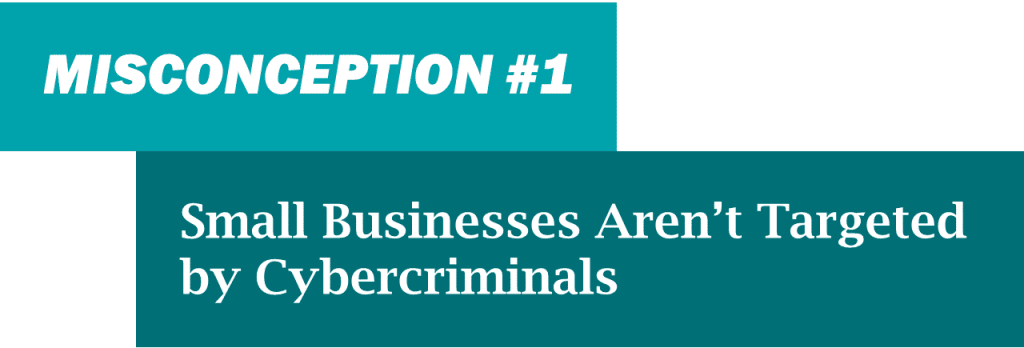
One of the most dangerous misconceptions about cybersecurity for small businesses is the belief that they are not targets for cybercriminals. Many small business owners assume that cyberattacks are primarily aimed at larger corporations with more valuable data.
However, this assumption could not be further from the truth. In fact, according to a recent report, small businesses are 3x more likely to be targeted than larger companies.
Small businesses are often more attractive targets for cybercriminals precisely because they are often seen as easy prey due to their limited security measures. The consequences of these attacks can be devastating, leading to significant financial losses, reputational damage, and even the closure of the business.
The importance of cybersecurity in small businesses cannot be overstressed. By underestimating the threat, many small businesses fail to implement even basic security measures, leaving them vulnerable to breaches. It is essential to recognize that no business is too small to be targeted and to take proactive steps to protect your company’s data and systems.
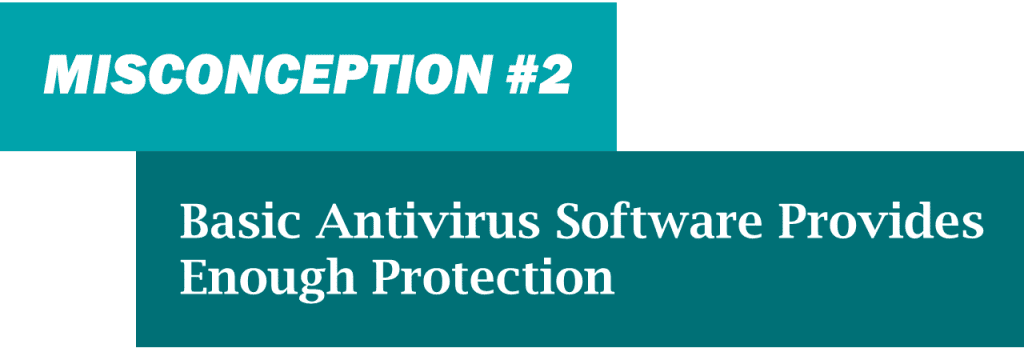
Another widespread misconception is that basic antivirus software is sufficient to protect a small business from cyber threats. While antivirus programs play a key role in detecting and removing certain types of malware, relying solely on them for cybersecurity is like using a padlock to secure a vault —it is simply not enough.
Cyber threats have evolved far beyond simple viruses. Today’s cybercriminals use sophisticated tactics like phishing, ransomware, and zero-day exploits, which can easily bypass basic antivirus software. These advanced threats require a more comprehensive approach to security that includes multiple layers of defense.
This is where managed security services for small businesses come into play. Managed security services offer a comprehensive approach to cybersecurity by providing continuous monitoring, threat detection, and incident response. These services go beyond the capabilities of standard antivirus software, addressing a broader range of threats and ensuring that your business is protected from emerging risks.
Small businesses must understand that cybersecurity is not a one-size-fits-all solution. While antivirus software is a necessary component, it should be part of a larger, more robust security strategy that includes firewalls, intrusion detection systems, regular software updates, and employee training.
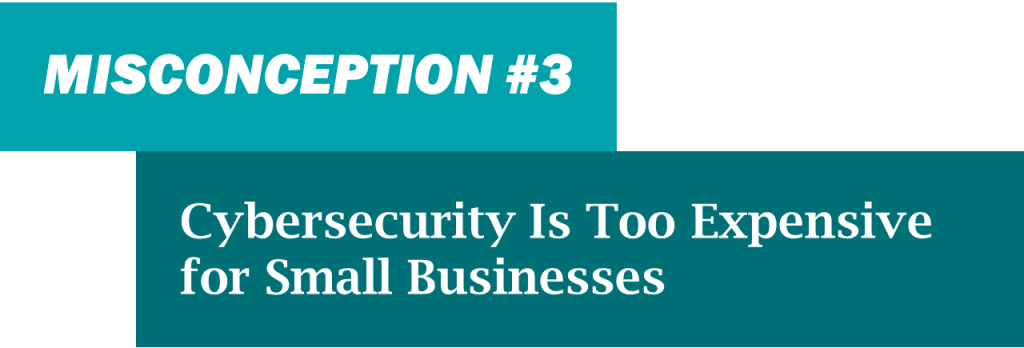
Many small businesses believe that effective cybersecurity is beyond their budget, leading them to skimp on essential protections. This misconception stems from the idea that robust security measures are only affordable for large enterprises. However, the perceived prohibitive cost of cybersecurity can be misleading.
The cost of a cyberattack is often far greater than the investment required to prevent it. A single data breach can lead to substantial financial losses, including fines, legal fees, and the loss of customer trust. In some cases, these costs can even force a small business to shut down.
Therefore, when considering the value of small business data protection, it is crucial to weigh the potential losses against the cost of implementing security measures.
Affordable cybersecurity solutions are available, tailored specifically to the needs and budgets of small businesses. These solutions can include cloud-based security services, managed security services, and scalable software that can grow with your business.
By choosing the right combination of tools and services, small businesses can protect their assets without breaking the bank.
Moreover, investing in cybersecurity should be viewed as a long-term strategy that pays dividends in the form of risk mitigation, business continuity, and customer trust. It is important to dispel the myth that cybersecurity is an unnecessary expense and instead recognize it as a crucial investment in the future of your business.
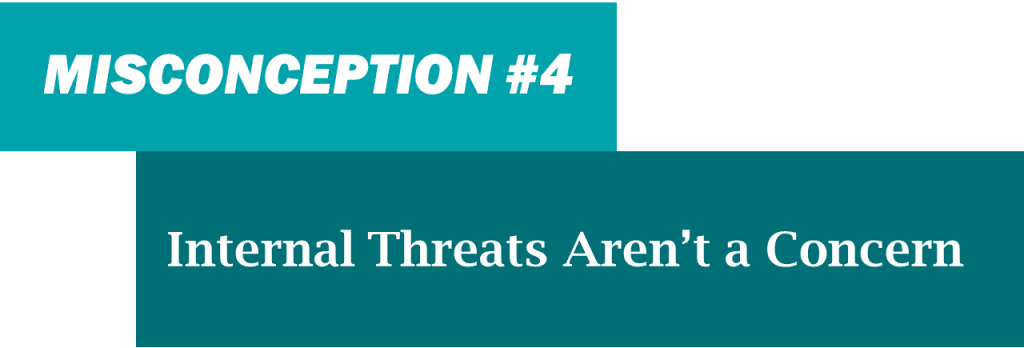
A common oversight among small businesses is the belief that cybersecurity threats only come from external sources. While external attacks from hackers and cybercriminals are indeed a major concern, internal threats can be just as damaging.
Unfortunately, many small businesses underestimate the risks posed by their own employees, whether intentional or accidental.
Internal threats can take many forms. They may involve a disgruntled employee deliberately leaking sensitive information or a mistake, such as an employee clicking on a phishing link or mishandling data. The impact of these internal threats can be severe, leading to data breaches, financial losses, and reputational damage.
To combat these risks, it is essential to implement robust access controls and cybersecurity best practices for employees. Limiting access to sensitive data to only those who need it, regularly updating passwords, and monitoring employee activity can significantly reduce the risk of internal breaches.
Managed security services for small businesses also offer solutions to help mitigate internal threats. These services can include monitoring for unusual behavior, detecting insider threats, and ensuring that employees adhere to security protocols.
By recognizing that internal threats are a real and present danger, small businesses can take proactive steps to protect their data and systems from within.
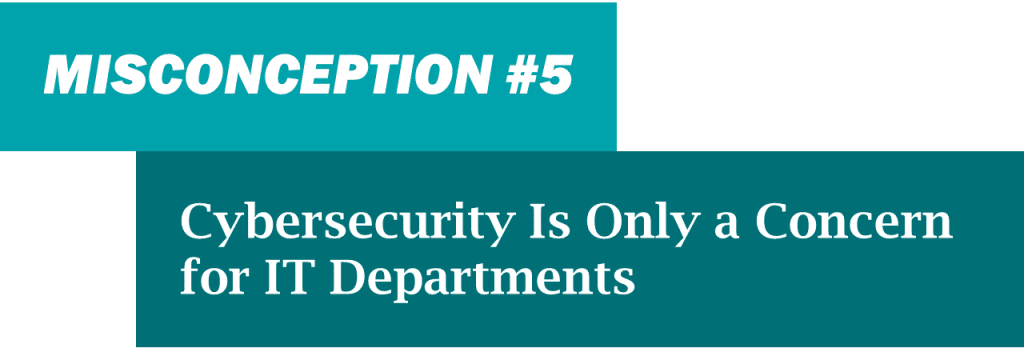
Another common misconception is that cybersecurity is solely the responsibility of the IT department. While IT professionals play a crucial role in managing and maintaining security infrastructure, cybersecurity should be a company-wide concern. The belief that only IT should handle cybersecurity can leave other parts of the business vulnerable to attacks.
Cybersecurity risks for small businesses are not confined to the IT department. Employees across all departments interact with technology daily, whether through email, cloud services, or handling customer data. This means that everyone in the company has a role to play in maintaining security. Without a company-wide commitment to cybersecurity, even the most sophisticated IT defenses can be undermined by human error.
Leadership should prioritize cybersecurity by fostering a culture of awareness and responsibility. This includes regular training for all employees on recognizing threats such as phishing scams, practicing good password hygiene, and understanding the importance of data protection. Additionally, communication between IT and other departments should be encouraged to ensure that everyone is aligned on security practices.
Regular updates on cybersecurity risks for small businesses should be part of the company’s routine. This not only helps in staying informed about the latest threats but also reinforces the idea that cybersecurity is a shared responsibility. By making cybersecurity a priority for the entire organization, small businesses can create a more resilient defense against potential attacks.
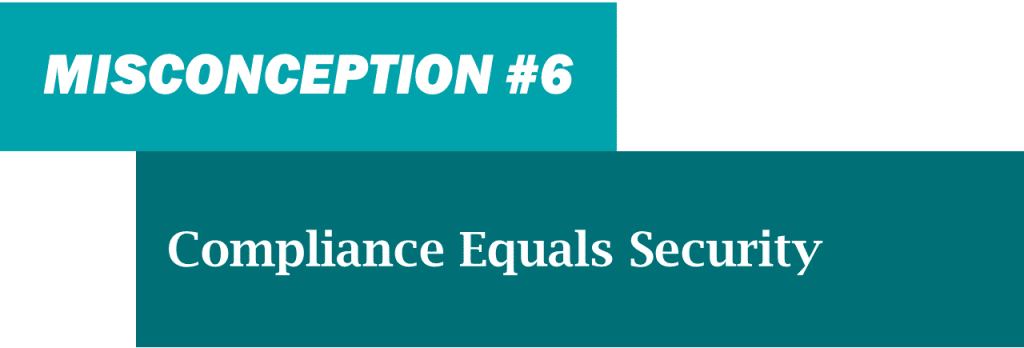
Many small businesses assume that meeting regulatory compliance requirements is the same as being fully secure. While compliance is important, it does not guarantee complete protection against cyber threats. Compliance standards often set a baseline for security, but they do not account for the evolving nature of cyberattacks or the specific vulnerabilities of your business.
Compliance focuses on meeting certain legal or industry-specific standards, which are often designed to protect customer data and ensure privacy. However, these standards may not cover all aspects of cybersecurity, such as protecting against new threats, employee errors, or insider threats. As a result, businesses that only aim for compliance may leave gaps in their security posture.
To truly protect your business, it is essential to go beyond mere compliance and implement a comprehensive security strategy. This involves regularly assessing your security measures, staying informed about emerging threats, and adapting your defenses accordingly. Investing in advanced tools and services, such as managed security services, can help you stay ahead of cybercriminals and ensure that your security measures are as robust as possible.
Enhancing small business data protection requires a proactive approach that looks beyond compliance checkboxes. By integrating security best practices into your daily operations and continuously improving your defenses, you can build a stronger, more resilient cybersecurity framework that better protects your business from evolving threats.
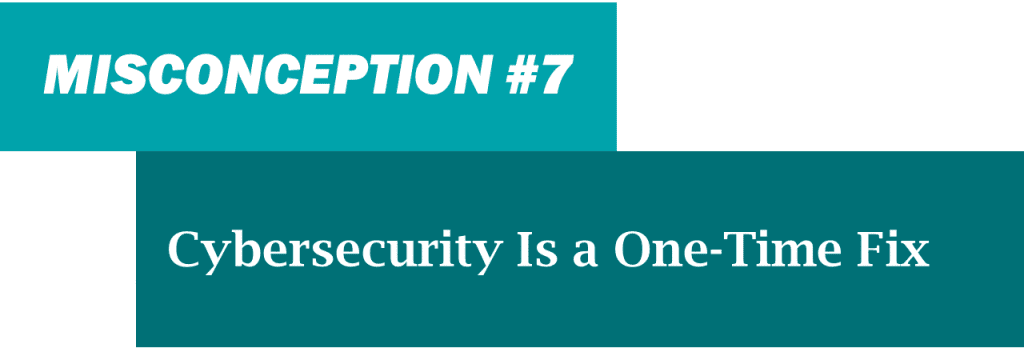
One of the most pervasive misconceptions about cybersecurity is the belief that it is a one-time fix. Some small business owners think that once they have implemented certain security measures, their work is done. However, cybersecurity is not a static process; it requires ongoing attention and adaptation.
Cyber threats are constantly evolving, with new vulnerabilities and attack methods emerging regularly. What worked last year, or even last month, may no longer be sufficient to protect your business today. This dynamic nature of cybersecurity means that small businesses need to stay vigilant, regularly updating their defenses and adapting to new threats.
Continuous monitoring is crucial for identifying potential vulnerabilities before they can be exploited. Regular software updates, patch management, and security audits are all essential components of a proactive cybersecurity strategy. These practices help ensure that your systems remain secure against the latest threats.
Managed security services for small businesses offer an effective way to maintain ongoing protection. These services provide continuous monitoring, threat detection, and timely response to security incidents, ensuring that your business is protected around the clock. By recognizing that cybersecurity is an ongoing process, you can better safeguard your business from both current and future threats.
Cybersecurity for small businesses is fraught with misconceptions that can lead to significant vulnerabilities. Understanding the reality of these misconceptions is the first step toward building a robust cybersecurity strategy. By recognizing that every business, regardless of size, is at risk and that basic measures like antivirus software and compliance are not enough, you can begin to implement more comprehensive security solutions.
At thirtyone3 technology, we specialize in helping small businesses navigate the complexities of cybersecurity. Our tailored solutions, including managed security and backup services, are designed to address the specific challenges you face. We are here to help you move beyond misconceptions and build a security framework that protects your business from the evolving threats of the digital age.
Do not let these common misconceptions put your business at risk. Invest in comprehensive cybersecurity measures today to safeguard your company’s future. Contact us today to get started!
Join hundreds of business leaders and get our perspective on critical issues delivered to your inbox..